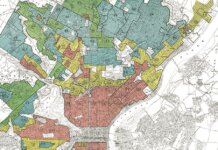Sales to institutional investors – defined as entities that purchase at least 10 properties in a calendar year – accounted for 4.3% of all single-family home sales in the third quarter, down from 5% in the second quarter and down from 5.3% in the third quarter of 2013, according to RealtyTrac's Q3 2014 U.S. Institutional Investor & Cash Sales Report.
Meanwhile, all-cash sales accounted for 33.9% of all single-family home sales in the third quarter, down from 36.9% in the second quarter and unchanged from a year ago.
‘Cash sales continue to be an important piece of the real estate puzzle right now, representing one in every three home sales nationwide in the third quarter of 2014 and helping to drive up U.S. median home prices 38 percent over the last two and half years,’ says Daren Blomquist, vice president at RealtyTrac, in a release. ‘As institutional investors and other cash buyers slow down their purchasing in many markets across the country, more traditional buyers – including first-time homebuyers and move-up buyers – will need to increasingly fill in the missing puzzle pieces to maintain the momentum of the housing recovery.’
Blomquist points out that while ‘institutional investors are still actively purchasing single-family rentals,’ they ‘continue to gravitate toward markets where lower-end inventory is still available.’
‘Meanwhile there has been a recent surge in cash buyers in some markets, often coinciding with either a rebound in distressed sales attracting bargain-hunting cash buyers or a booming job market engendering a competitive bidding environment where cash is king,’ he adds.
Markets that had the highest share of institutional investor purchases in the third quarter were Memphis, Tenn. (16.4%); Charlotte-Gastonia-Concord, N.C. (14.2%); Columbus, Ohio (12. 6%); Atlanta-Sandy Springs-Marietta, Ga., (12.5%); and Orlando, Fla. (11.0%).
Markets that saw the highest share of all-cash sales included Houston (36.3%); San Antonio, Texas (30.9%); Boston (29.1%), Dallas (30.0%), Indianapolis (29.2%) and Cleveland (45.2%).
For more, click here.











